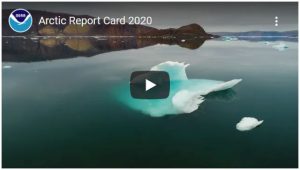2020 Arctic Report Card Released
The sustained transformation to a warmer, less frozen and biologically changed Arctic remains clear
 On December 8, 2020, the 2020 Arctic Report Card was released at the AGU Fall Meeting in a press conference. This 15th annual Arctic Report Card catalogs the numerous ways that environmental change continues to transform and disrupt the Arctic region, with impacts on weather, climate, fisheries, ecosystems, and Indigenous communities. It was compiled by 134 scientists from 15 countries. The press conference generated strong coverage and more than 55 stories from major US and international outlets, including the Washington Post, New York Times, CNN, Associated Press, CBS News, Reuters, The Guardian, Agence France Presse. RDML Tim Gallaudet, Ph.D. Ret Navy & Acting Under Secretary of Commerce for Oceans and Atmosphere/ NOAA Administrator provided introductory remarks for the press conference, and Report Card editors Rick Thoman and Jackie Richter-Menge, and authors Alison York, JC George, and Matthew Shupe provided insights on hot topics.
On December 8, 2020, the 2020 Arctic Report Card was released at the AGU Fall Meeting in a press conference. This 15th annual Arctic Report Card catalogs the numerous ways that environmental change continues to transform and disrupt the Arctic region, with impacts on weather, climate, fisheries, ecosystems, and Indigenous communities. It was compiled by 134 scientists from 15 countries. The press conference generated strong coverage and more than 55 stories from major US and international outlets, including the Washington Post, New York Times, CNN, Associated Press, CBS News, Reuters, The Guardian, Agence France Presse. RDML Tim Gallaudet, Ph.D. Ret Navy & Acting Under Secretary of Commerce for Oceans and Atmosphere/ NOAA Administrator provided introductory remarks for the press conference, and Report Card editors Rick Thoman and Jackie Richter-Menge, and authors Alison York, JC George, and Matthew Shupe provided insights on hot topics.
Highlights from the report include:
The average annual land-surface air temperature in the Arctic measured between October 2019 and September 2020 was the second-warmest since record-keeping began in 1900, and was responsible for driving a cascade of impacts across Arctic ecosystems during the year. Nine of the past 10 years saw air temperatures at least 1 degree C above (1.8 degrees F) the 1981-2010 mean. Arctic temperatures for the past six years have all exceeded previous records.
Extremely high temperatures across Siberia during spring 2020 resulted in the lowest June snow extent across the Eurasian Arctic observed in the past 54 years.
The 2020 Arctic minimum sea ice extent reached in September was the second-lowest in the satellite record. Overall thickness of the sea ice cover is also decreasing as Arctic ice has transformed from an older, thicker, and stronger ice mass to a younger, thinner more fragile ice mass in the past decade.
The MOSAiC Expedition, the yearlong expedition based from the Polarstern icebreaker in the central Arctic Ocean, drifted much faster than anticipated through thinner ice than expected, experiencing sea ice dynamics that complicated the scientific mission.
Extreme wildfires in the Sakha Republic of northern Russia during 2020 coincided with unparalleled warm air temperatures and record snow loss in the region.
Pacific Arctic bowhead whales have rebounded in the past 30 years, due to increases in both local plankton blooms and transport of increased krill and other food sources northward through the Bering Strait, a signal of long-term warming in the Arctic Ocean.
Learn more about the 2020 Arctic Report Card: read the full report, the 15 year retrospective, NOAA’s press release, watch the video, and learn about the editors. Watch the AGU press conference video.